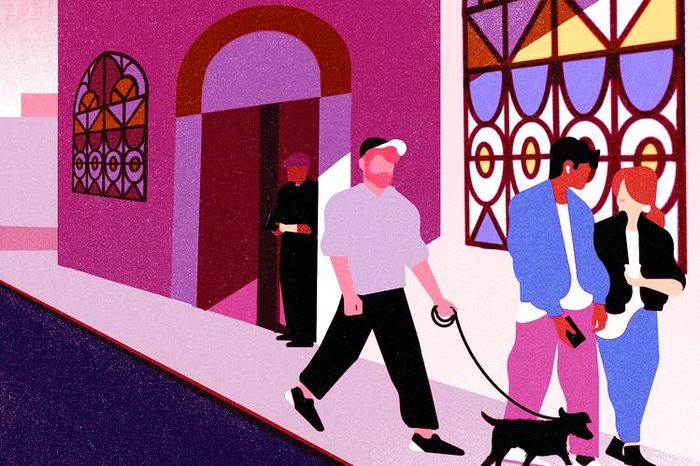Why an Atheist started streaming church in a pandemic
In the wake of Covid-19, atheist columnist Jesi Bailey reflects on reigniting her faith in humanity… through online church.

I always thought I should be religious. I would describe myself as an intrinsically faithful person, always chasing some kind of magic, but the idea of traditional religious spaces always felt rather restrictive and unnatural. Instead, I decided to make my own rules. My churches were concert venues, dance clubs, cinemas. I found worship in places of collective emotion, in the moments when the music swells, or the lights change, and you suddenly become aware that everyone around you is feeling just as strongly as you are, connected by the same passion and intensity that makes you human. My faith lies in that connection to others, and it is driven by these experiences.
Then, abruptly, those moments were gone. No large gatherings, no crowds, no chance for a collective anything. My brand of worship became impossible in a time where the greatest shared emotion to be found was loneliness, and I struggled to feel connected to others. Like just about everyone, I attempted to remedy this by claiming a new saviour: Zoom. While I did manage to grow steadily more confident in my ability to lose pub quizzes and online games with grace, the sense of being a part of something bigger than myself evaded me. I grew more frustrated until I eventually stopped interacting with people at all. With no way to connect to others in the ways that drive me, I became isolated from my own sense of self, with no end in sight.
“I found worship in places of collective emotion, in the moments when the music swells, or the lights change.”
You know what they say about desperate times.
It was in the midst of another mindless internet scrolling session that I came across a notice from a local church. From now on, they announced, they would be streaming their services online, allowing congregants to engage with their faith from home. A stubborn spark of optimism struck me, although I immediately tried to stamp it out. This seemed too neat a solution to my problem, the idea that I could find a connection to faith by piggybacking on someone else’s, not least through the kind of religious practice I had avoided for years. I was feeling cynical enough to quickly dismiss the thought, confidently believing that my attendance would be a waste of time.
Here’s one for the confession booth: I was desperate enough to do it anyway. On a dreary Sunday morning, pyjama-clad and over-caffeinated, I opened up my laptop and went to church.
“If I could find salvation, in a virtual church of all places, then I could believe we really are all the same at the core of us.”
There were a lot of things I didn’t understand. Stories and traditions were referenced quickly and often, making use of congregants’ biblical knowledge to weave together detailed messages. As someone without that familiarity, I was immediately overwhelmed. I had an idea that churches were these alien, exclusionary things, and it was difficult to force myself to stay through those beginning moments, fearing my prejudices were correct.
Things drastically changed only after I forced myself to place my focus less on the things that confused me, and instead on the overarching lessons I was meant to be taking from the sermon. By looking away from those details I had been caught up in, I could finally see past my own biases about what I thought traditional religious practice would be. I could recognise that the messages being emphasised more than anything else were those of love, kindness, and hope. My kind of faith, which I had long believed to be incompatible with an organised religious experience, was easily found in the shared values of unity, passion, and trust in your fellow man. There was something beautiful in knowing that though we framed those ideas slightly differently, we held them holy all the same.
If anyone’s wondering, I am still an atheist. Attending church didn’t change my beliefs about the existence of a god or an afterlife, but that isn’t why I did it. That certainly isn’t why I kept coming back, week after week. I was there because I needed to know that the faith I place in others, in that idea that we are all connected, still meant something. For an hour every week I could feel like a part of something again, knowing there were others out there watching alongside me, feeling the same comfort and hope that I was. I still couldn’t tell you who John is, but that wasn’t what mattered. If I could find salvation, in a virtual church of all places, then I could believe we really are all the same at the core of us. That was what I needed reminding of. That’s what this experience gave me. Maybe I’ll physically go there one day and tell them what they did for me. I think we could all use news like that.
 News / Right-wing billionaire Peter Thiel gives ‘antichrist’ lecture in Cambridge6 February 2026
News / Right-wing billionaire Peter Thiel gives ‘antichrist’ lecture in Cambridge6 February 2026 Features / From fresher to finalist: how have you evolved at Cambridge?10 February 2026
Features / From fresher to finalist: how have you evolved at Cambridge?10 February 2026 Film & TV / Remembering Rob Reiner 11 February 2026
Film & TV / Remembering Rob Reiner 11 February 2026 News / Churchill plans for new Archives Centre building10 February 2026
News / Churchill plans for new Archives Centre building10 February 2026 News / Epstein contacted Cambridge academics about research funding6 February 2026
News / Epstein contacted Cambridge academics about research funding6 February 2026










